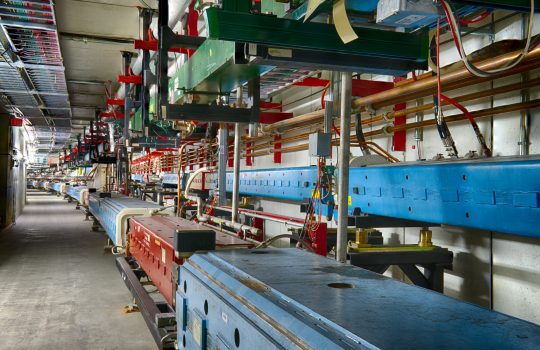Batavia, Ill. Secretary of Energy Bill Richardson will help usher in a new era in physics at the energy frontier when he takes a wrench to four bolts at the Department of Energy¹s Fermi National Accelerator Laboratory on Thursday, September 24.
Richardson will tighten the last four bolts on the final 20-ton dipole magnet one of 432 electromagnets, each 30 feet long, connected in a two-mile underground ring to be installed in Fermilab¹s new Main Injector Accelerator, a six-year, $229 million construction project. The new accelerator will inject high-energy protons into Fermilab¹s Tevatron, more than tripling the scientific capability of the world¹s most powerful particle accelerator. By creating trillions of high-energy collisions between subatomic particles moving at nearly light speed, the Tevatron allows scientists from across the U.S. and around the world to study the structure of matter at the smallest scale ever observed by human beings.
“I am proud that the Department of Energy is playing such a prominent and leading role in the science of high-energy physics,” Richardson said. “Fermilab¹s new Main Injector will open up extraordinary new opportunities for discovery in this basic field of research, not only for scientists from the United States but for the international physics community. Through projects like the Main Injector, the Department is committed to keeping the U.S. among world leaders in particle physics research.”
The Department of Energy funds more than 90 percent of all federally supported U.S. research in high-energy physics, including the building and operating of large accelerator laboratories like Fermilab, 30 miles west of Chicago. Paradoxically, the smaller the particles being observed, the larger the tools scientists must use to study them; and particle accelerators are the largest scientific instruments ever built. The scale of these instruments long ago outgrew the resources of single research universities to build and operate. Fermilab¹s Tevatron, four miles in circumference, is one of only a handful of particle accelerators in the U.S., Europe and Japan. University physicists and their students use these federally funded facilities to carry out experiments that unlock the secrets of the fundamental structure of matter.
When the new Main Injector begins operating early next year, it will greatly increase the number of high-energy particle collisions produced by the Tevatron, heightening its potential for revealing new physics insights. Thus the installation of the final Main Injector magnet marks a major milestone for Fermilab.
“We have looked forward to this day for a long time,” said Main Injector Project Manager and Fermilab physicist Stephen Holmes. “Many people have worked hard to finish the Main Injector on time and on budget. With the last magnet in place, our sense of accomplishment will be exceeded only by our anticipation of the new science that this accelerator will deliver.”
After tightening the final bolts, Richardson will join in a longstanding high-energy-physics tradition of celebrating the installation of the last magnet in a particle accelerator. He will add his signature to those of Holmes and hundreds of others who helped build the new accelerator, on a board titled “Fermilab Main Injector. Last Magnet Installed September 24, 1998.”
Fermilab is operated by Universities Research Association Inc. under contract with the U.S. Department of Energy.
WHO:
Secretary of Energy Bill Richardson
WHAT:
Will install final magnet in new Fermilab Main Injector Accelerator
WHEN:
1:00 p.m., Thursday, September 24
WHERE:
Fermilab Main Injector Tunnel, Fermilab Batavia, IL (Call for directions 630-840-3351)


